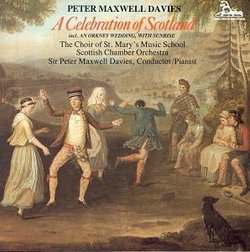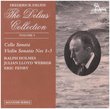| All Artists: Peter Maxwell Davies, Scottish Chamber Orchestra, George MacIlwham, The Choir of St. Mary's Music School Title: Celebration of Scotland Members Wishing: 0 Total Copies: 0 Label: Unicorn Release Date: 12/7/1993 Album Type: Import Genres: Folk, Classical Styles: Opera & Classical Vocal, Chamber Music, Forms & Genres, Concertos, Short Forms, Theatrical, Incidental & Program Music, Historical Periods, Modern, 20th, & 21st Century, Instruments, Keyboard, Strings Number of Discs: 1 SwapaCD Credits: 1 UPC: 053068907026 |
Search - Peter Maxwell Davies, Scottish Chamber Orchestra, George MacIlwham :: Celebration of Scotland
 | Peter Maxwell Davies, Scottish Chamber Orchestra, George MacIlwham Celebration of Scotland Genres: Folk, Classical
|
Larger Image |
CD DetailsSimilar CDs |
CD ReviewsWhen PMD dons his kilt and lets his hair down - a disc for t Discophage | France | 06/06/2009 (4 out of 5 stars) "The one substantial piece on this CD - and, consequently, the only one that is not entirely easy-listening, but that is ultimately, in my opinion, the most rewarding - is "Jimmack the Postie" (track 12). It is a 9-minute orchestral overture, supposedly "an affectionate portrait of the postman on the Orcadian island of Hoy". That must be a make-believe, something MD made up to obtain the commission from the Scottish Postal Board. Written in 1985, it is roughly contemporary with the 3rd Symphony (Maxwell Davies: Symphony No. 3, Peter Maxwell Davies: Symphony No. 3), and you can hear it. Like the symphony, it evokes not so much a postman (or what a Postman! Hounds, beware!) as the wild and agitated atmosphere of the ocean, the "sea-drenched soundscape, haunting landscape and apocalyptic light-effects" that the liner notes allude to, seen and heard through the composer's window, where the Atlantic and the North Sea meet. Only after 8:15 does a beam of light shine through, in the form of a lyrical theme on the flute. Maxwell Davies has lived in the Orkney Islands off Northern Scotland since 1971 and, by his own admission, this rugged environment has had a profound influence on his music. It has resulted in Symphonies (especially No. 2 from 1980, Maxwell Davies: Symphony No. 2, and the above-mentioned No. 3) that are alternately sombre and brooding, and tempestuous. But there is a lighter side of the Orkney influence, as the present disc bears witness. "An Orkney Wedding, with Sunrise" (track 1) is another boisterous orchestral showpiece, written in 1985 for the Boston Pops. Except for a few moments, its moods and compositional processes are decidedly lighter and easier-listening than "Jimmack the Postie". It is very graphic in its depiction of a wedding on the same Island of Hoy served by Jimmack (doesn't say if he was invited to the party), integral with romping dances and invented folk-tunes. At the end of the piece MD introduces bagpipes to accompany the triumphant (and somewhat bombastic) sunrise, although they are not part of the cultural heritage of Orkney. It is not very substantial, but brilliantly orchestrated. "Kinloche His Fantassie" (1976) is a realization for MD's Fires of London Sextet (flute, clarinet, violin, cello, piano and percussion - the ensemble of Schoenberg's Pierrot Lunaire) of a keyboard piece by the obscure Scottish Renaissance composer William Kinloch, and the "Renaissance Scottish Dances" (1973) are the same thing from material found in volume 15 of the Musica Britannica series, devoted to "Music of Scotland, 1500-1700" (the liner notes aren't informative enough about that, I've fished on the internet for more), while the Dances from "The Two Fiddlers" is an arrangement for the same ensemble of instrumental dances from MD's opera for young performers. Their style is (reinvented) country dance. These arrangements and imitations certainly showcase MD at his most accessible, but not necessarily his most characteristic. "Yesnaby Ground" (track 10) and "Farewell to Stromness" (13) are two simple piano interludes written by MD (who performs himself here) for "The Yellow Cake Revue", a Cabaret he wrote in 1980 to protest against the plans to initiate open-pit uranium mining in Orkney. Although the second is apparently MD's most popular composition (having even made the British radio charts in 2003), they are pretty but not very significant, two pop ballads, pensive and nostalgic, developing above a ground bass. For a while I thought I was back in an anthology of easy-listening repetitive music. One aspect of MD's activity in Orkney is his work with young performers, here illustrated by two works for Children's Choir: "Seven Songs Home" and "Lullabye for Lucy" (both composed in 1981). The latter is set on words by the Scottish novelist and poet George Mackay Brown (1921-1996), with whom MD collaborated on a number of works. It is an acrostic poem, meaning that the first letter of each verse, read vertically, form a new word or phrase, here "Lucy Rendall", "the first child born in the valley of Rackwick [on the Island of Hoy] in thirty-two years" say the notes - such was apparently the bright future of where MD elected to live. The music is very simple and lulling, evocative of a Christmas Carol or, indeed, a lullaby. Very pretty and certainly suited to its goal (music for school choir), but not particularly significant. The texts of "Seven Songs Home" are by the composer himself, and they are great, witty and charming, depicting "one hour in a child's life, from the time he leaves school until he finally reaches home". Again the music setting is simple, but with wonderfully imaginative touches and, cleverness and verve of the text helping, it is imbued with a charm and vivacity that makes it a worthy successor of the Ceremony of Carols or anything written by Britten for children's voices. With "Jimmack the Postman" and in an entirely different style, this is the masterpiece of this collection, transcending any consideration of "modernism" vs "traditionalism". " A Celebration of Scotland John P. Kuch | Michigan, USA | 05/21/2008 (5 out of 5 stars) "Sir Peter Maxwell Davies is an outstanding composer from the Orkneys in Scotland. This is a recording conducted and performed by the composer. It is a great CD to get to know his music. "An Orkney Wedding" is a real musical treat." A must have PMD...... Paul | Houston | 07/06/2009 (5 out of 5 stars) "I HATE CONTEMPORARY MUSIC.....EXCEPT for this disc which is spectacular in its scope. Yep, it was my discovery of Sir Peter and I will most certainly buy more. Don't miss the 2nd review as it quite extensive, authoritative and worthy of a careful read. This disc has been out of print for MANY MANY years....and sit back and enjoy. The stereo soundstage and prodution is extremely good...no actually superlative.
Paul Houston" |

 Track Listings (21) - Disc #1
Track Listings (21) - Disc #1
